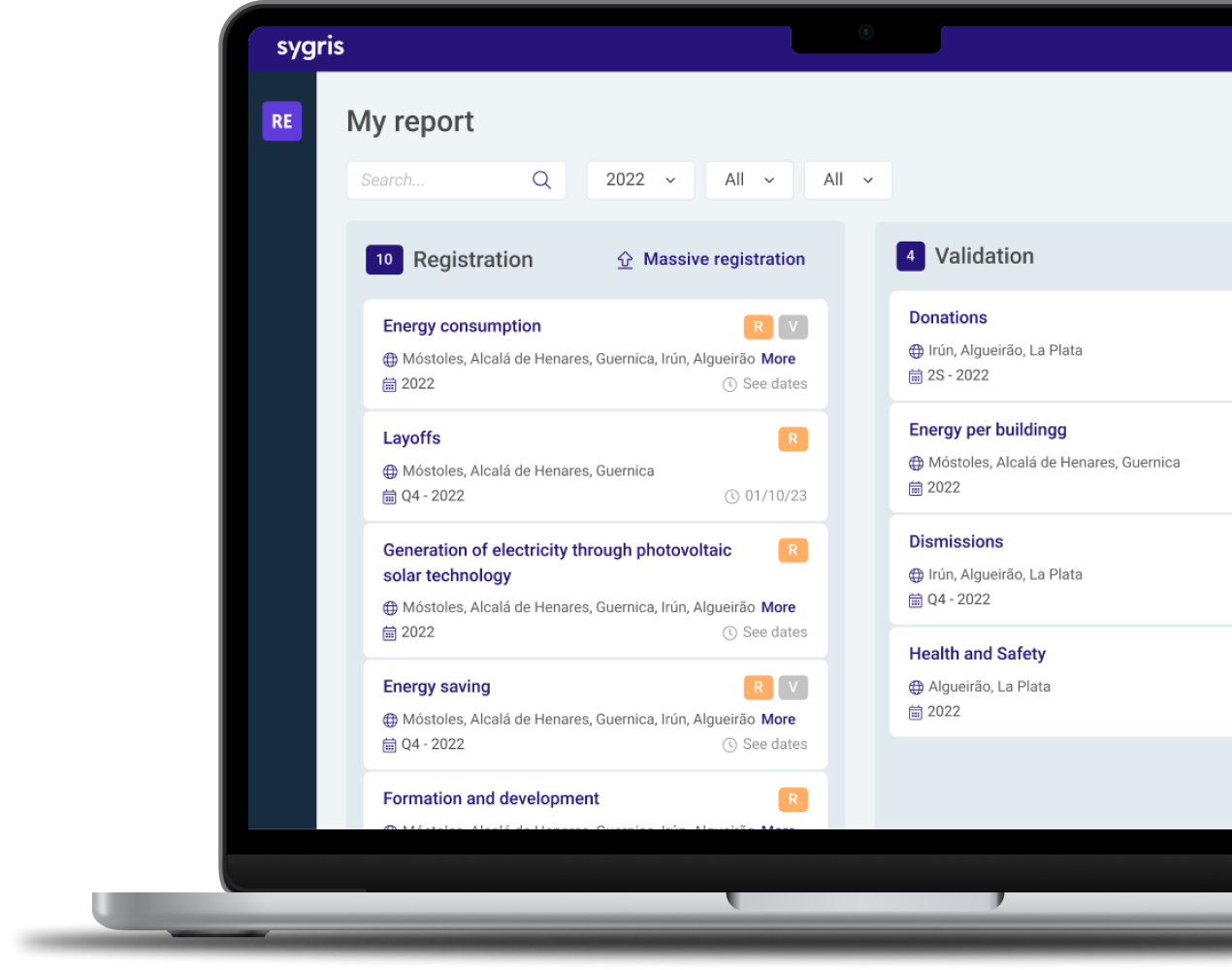In a bid to strengthen a more sustainable European market and align with the European Green Deal, Spain has recently passed the Corporate Sustainability Information Act. This law brings the European Corporate Sustainability Reporting Directive (CSRD) into Spanish legislation, introducing significant changes for companies around the disclosure of environmental, social, and governance (ESG) activities. Under this new framework, Spanish companies will need to provide greater transparency about their impact on society and the environment, raising the quality and comparability of sustainability reports.
This article outlines the key points of the new law, its implications for businesses, and how Sygris Reporting can serve as a tool to facilitate compliance.
What is the Corporate Sustainability Information Law?
The Corporate Sustainability Information Act implements the EU Directive 2022/2464 – also known as the CSRD – into Spanish law. Part of the European Union’s drive for a more accountable business environment aligned with sustainable goals, this law replaces the previous Non-Financial Reporting Directive (NFRD), which was transposed into Spain through Act 11/2018, expanding both the scope and requirements of sustainability reporting.
Under the new law, companies are expected to go beyond reporting on their sustainable practices and targets by detailing impacts across their value chains and on their surroundings. Further information can be found on the website of Spain’s Ministry of Economic Affairs and Digital Transformation, which outlines the finer points of the new regulation.
Key Features and Requirements
Here are some key elements of the new law, designed to boost transparency in corporate sustainability reporting:
- Broader scope: The new regulation affects not only large companies but also listed SMEs and parent companies of large groups, meaning a wider range of companies in Spain will be required to produce sustainability reports in line with the European Sustainability Reporting Standards (ESRS).
- Mandatory impact reporting: Companies will need to report on their internal practices as well as their wider impacts on society and the environment across their entire value chain. This approach enhances transparency, giving stakeholders a fuller picture of the company’s sustainability efforts.
- External audits and data verification: To ensure the reliability of ESG data, the law requires sustainability reports to undergo external auditing. This verification ensures that the published data is accurate and trustworthy, building greater confidence among investors and the public.
- Long-term sustainability goals: Companies will need to set and report on their sustainability goals in a clear, measurable way over the long term, aligning these with the UN’s Sustainable Development Goals (SDGs). These goals will be regularly reviewed, facilitating consistent progress tracking.
- Digitalisation of sustainability reporting: The regulation promotes the use of digital platforms for collecting, analysing, and reporting sustainability data. Digitalisation not only makes report creation more accurate and accessible but also enhances companies’ ability to adapt quickly to regulatory changes. For further details on how digitalisation can support compliance, visit the Ministry’s website.
Challenges and opportunities for companies
Complying with the Corporate Sustainability Information Act presents a challenge for many companies in Spain, but it also offers an opportunity to transform internal processes and improve sustainability.
- Resource and capacity development: Collecting and managing large volumes of ESG data requires investment in systems and staff training. For many companies, this is an opportunity to modernise their systems and enhance their capacity for sustainability data management.
- Fostering a culture of transparency: Transparency and accountability are now key elements of the relationship between businesses and stakeholders. This law will encourage companies to improve their practices and build an organisational culture rooted in sustainability.
- Enhanced competitiveness: Companies that effectively implement the Corporate Sustainability Information Act’s requirements will stand out in a market increasingly geared toward sustainability. Investors, customers, and partners are placing greater value on companies that demonstrate a solid commitment to sustainability.
Preparing for compliance
Implementing the law requires strategic planning and efficient integration of sustainability practices into corporate management. Here are some steps to help companies prepare:
- Internal sustainability assessment: Conduct an internal audit to assess the company’s current ESG position. This step is crucial for identifying areas that need improvement.
- Setting clear sustainability goals and targets: Establish clear, measurable targets that align with the SDGs and company values, including both short- and long-term objectives.
- Implementing digital management systems: Use digital tools like Sygris Reporting to manage ESG data. Digitalisation facilitates data collection, analysis, and reporting, ensuring the company is well-prepared to meet audit and transparency requirements.
- Staff training and awareness: Invest in employee training so that everyone understands the importance of ESG practices and how their roles contribute to sustainability goals.
- External audits and verification: Ensure that sustainability reports are accurate and reliable through external audits, which not only help with compliance but also strengthen the company’s credibility.
Solutions for Transitioning to the New Law
Adapting to the Corporate Sustainability Information Act requires robust systems for managing and reporting ESG data. Reporting tools have become essential for streamlining the collection, organisation, and analysis of large volumes of information, especially when accuracy and transparency are paramount. These platforms help companies manage and structure data centrally, enhancing their ability to meet ESG standards and address external audit requirements.
Digital reporting solutions that integrate multiple data sources and generate customisable reports are a strategic advantage for companies looking to go beyond mere compliance and establish strong sustainability practices. These tools also allow for seamless updates as regulatory requirements evolve, supporting continuous adaptation.
In this context, Sygris Reporting is an essential tool for navigating the new regulations. It offers a comprehensive solution for ESG data management and reporting, helping companies to adapt quickly and effectively to any ESG legislation.
Key Features of Sygris Reporting:
- ESG data integration and analysis: Sygris Reporting enables companies to integrate ESG data from multiple sources into a single platform, making data consolidation and analysis more straightforward.
- Automated compliance management: Sygris’s platform is designed to keep up with ongoing changes in ESG regulations, ensuring that generated reports meet current legal requirements.
- Efficient audit management: With Sygris Reporting, companies can produce detailed, audit-ready reports, simplifying external verification and enhancing data transparency.
- Customisation and flexibility: The tool allows companies to create tailored reports for various stakeholders, improving data presentation and communication with stakeholders.
The approval of the Corporate Sustainability Information Act in Spain marks a major step forward for ESG reporting, demanding unprecedented levels of transparency and accountability in corporate sustainability practices. While adapting to this law poses a challenge, it also presents an opportunity for companies to cultivate a sustainability-oriented culture, boosting their competitiveness and reputation in the market.





